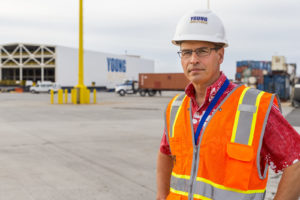Young Brothers President Feels Like He’s Spent His ‘Whole Life’ Preparing for His New Job

Joseph Boivin Jr. hopes to make Young Brothers “the lowest-cost, highest-quality inter-island freight company in Hawaii. Photo: Lew Harrington.
“I was raised in a small town called East Lyme on Connecticut’s south shore. Since I grew up within walking distance to Long Island Sound, I spent a lot of time swimming and fishing. The water is only 65 degrees in the summer, but you get used to it after awhile,” he laughed.
“My dad had a fishing boat, and we spent many hours fishing and gathering clams and scallops from the bay at low tide. One of the things I miss about growing up in New England is the food: blue crab, lobster and lobster rolls, fried clams, steamers with butter, scallops — all incredible-tasting and fresh from the ocean.”
From chores around the house to strawberry picking, kitchen work at a five-star bed and breakfast to unloading lumber trucks with a fork lift, Boivin said each of the jobs he’s held brought him one step closer to his new ocean home.
“Only looking back do things seem to make sense,” he said, “but every one of my jobs built on the preceding one.”
Boivin joined the U.S. Air Force after high school and spent the following year learning how to be a jet engine and turboprop mechanic. He was deployed between 1988 and 1992 as part of Operation Desert Storm, and eventually earned his Federal Aviation Administration certification as an Airframe and Powerplant Mechanic. Based at Little Rock Air Force Base in Little Rock, Arkansas, he worked on the flight line from 4 p.m. to 12 a.m. and went to school full-time during the day for mechanical engineering.
Boivin decided to leave the military and completed his mechanical engineering degree at the University of Arkansas in Fayetteville. He earned his MBA there a year later. He joined Northrop Grumman in Texas building planes, then joined a top-secret organization called the Institute for Defense Analysis, where he assessed various military weapons programs for the Secretary of Defense and worked at the Pentagon.
“I met my wife Jan in D.C.,” he said. “Jan grew up in Mililani and always wanted to return someday. We were married in Honolulu in 2000, and moved to Oahu in 2004. That’s when I started working at the management consulting firm Booz Allen Hamilton — mostly economic and financial analyses for the military and some commercial customers.”
In 2009, Boivin was hired at Hawaii Gas to run statewide operations. And of his new position at Young Brothers, he said, “This feels like the job I’ve been preparing for my whole life.”
The best part, Boivin explained, is the opportunity to help Young Brothers transport itself into the future.
“So far, my greatest challenge is carving out the time each week to visit our employees across the islands,” he said. “But I intend to take a day per week to visit each of our six ports on Kauai, Hawaii, Molokai, Lanai, and Maui during the coming weeks. Our people are incredible. They load and unload barges with the utmost skill, then spend 24 hours or more pulling barges between islands. Sometimes during the year the waves, winds, and currents are extremely dangerous, and they are unable to enter the port upon arrival and have to turn around and come home. It’s their commitment that supplies the Hawaiian Islands with food, fuel, building materials, equipment, automobiles, cell phones, furniture, and many, many other items that are essential for the people of Hawaii.”
While Boivin’s future aspirations include spending a bit more time with his drum kit and on the golf course, and raising his nine-year-old twins, John and Sophia, to be “kind and generous,” the interstate and intrastate freight markets in Hawaii are changing — and he intends for Young Brothers to ride the wave.
“I’d like for our employees to understand how these changes affect our company and what we need to do to address them effectively,” he concluded. “The Hawaii Department of Transportation is embarking on major improvements in the Port of Honolulu that will fundamentally change how shipping companies operate; the inter-island freight market is experiencing increased competition; and the regulators that oversee our regulated business have clearly stated their preference to improve productivity and customer service, and implement performance-based incentives to drive costs down. Addressing these changes is going to take a renewed commitment to working together as a team to achieve a common goal: make Young Brothers the lowest-cost, highest-quality inter-island freight company in Hawaii.”
